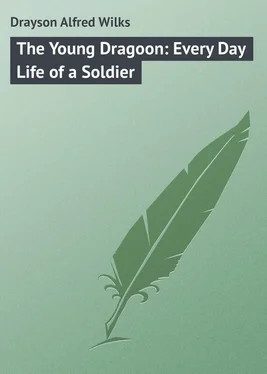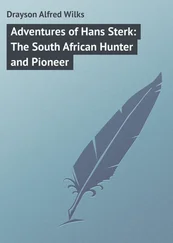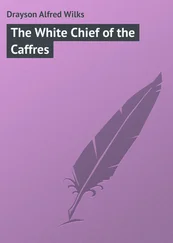Alfred Drayson - The Young Dragoon - Every Day Life of a Soldier
Здесь есть возможность читать онлайн «Alfred Drayson - The Young Dragoon - Every Day Life of a Soldier» — ознакомительный отрывок электронной книги совершенно бесплатно, а после прочтения отрывка купить полную версию. В некоторых случаях можно слушать аудио, скачать через торрент в формате fb2 и присутствует краткое содержание. Жанр: foreign_prose, foreign_children, на английском языке. Описание произведения, (предисловие) а так же отзывы посетителей доступны на портале библиотеки ЛибКат.
- Название:The Young Dragoon: Every Day Life of a Soldier
- Автор:
- Жанр:
- Год:неизвестен
- ISBN:нет данных
- Рейтинг книги:4 / 5. Голосов: 1
-
Избранное:Добавить в избранное
- Отзывы:
-
Ваша оценка:
- 80
- 1
- 2
- 3
- 4
- 5
The Young Dragoon: Every Day Life of a Soldier: краткое содержание, описание и аннотация
Предлагаем к чтению аннотацию, описание, краткое содержание или предисловие (зависит от того, что написал сам автор книги «The Young Dragoon: Every Day Life of a Soldier»). Если вы не нашли необходимую информацию о книге — напишите в комментариях, мы постараемся отыскать её.
The Young Dragoon: Every Day Life of a Soldier — читать онлайн ознакомительный отрывок
Ниже представлен текст книги, разбитый по страницам. Система сохранения места последней прочитанной страницы, позволяет с удобством читать онлайн бесплатно книгу «The Young Dragoon: Every Day Life of a Soldier», без необходимости каждый раз заново искать на чём Вы остановились. Поставьте закладку, и сможете в любой момент перейти на страницу, на которой закончили чтение.
Интервал:
Закладка:
But to return to my story. The hob-nailed boots stockings, shirt, fustian trousers, and waistcoat – I had no coat – were all sold to an Irishwoman for four shillings and sixpence: I spent the money among my comrades. My fellow recruit kept his watch, but freely assisted to drink the proceeds of my wardrobe.
I duly received my “kit,” which I may here remark absorbed the whole of the “bounty” (at that period amounting to four pounds, eleven shillings, and sixpence), and left me upwards of two pounds in debt; this was deducted from my daily pay of sixteen pence. The rations consisted of three-quarters of a pound daily of boiled meat – soup, potatoes, coffee, and bread – all of good quality; and these only cost eightpence, which, together with the stoppages, left me in the receipt of a daily income of threepence. The obliging corporal of my squad handed me over that sum every morning at breakfast-time. One penny of this I generally invested in a herring, rasher of bacon, or a lump of rancid butter, at the little chandler’s shop adjacent to the canteen in the barrack-yard; the other twopence was generally expended in beer, for I had not then learned the expensive habit of smoking. The cleaning materials – such as Bath-brick, soap, pipeclay, chrome-yellow, oil, blacking, etc – we could any time procure on credit from the sergeant-major of the troop, who booked our account and rendered it monthly. For these we paid most extravagant prices; and it was more than eight months before the two pounds, in which I was indebted at commencement, was paid off. I had, however, a new pair of overalls at a guinea, and a pair of Wellington boots at sixteen shillings and eightpence, during the interval. It is not, I believe, generally understood that, in addition to his rations, the soldier has to pay for a good portion of his clothing.
The regiment was composed of about equal numbers of Irish and English; and, to give the sons of Erin their due, I found them quite as agreeable and more obliging in their manner to recruits than their Saxon comrades. Strange to say, there was only one Scotchman in the corps, and he volunteered to the 9th, or Queen’s Lancers, and embarked with the regiment for India, in the winter of 184 – .
I soon became reconciled to my new life, and entered on my duty with a determination to excel, if possible, in that most difficult and arduous duty for a cavalry recruit – riding drills, in which I most erroneously imagined I should be all but perfect. I had ridden the cart-horses to water and pasture; had often trotted, and even galloped, my father’s old cob “Billy” to the shoeing smith’s, and had never yet been thrown. The first introduction, however, to those tormentors of the poor recruit – the “rough-riders” – soon convinced me that I was most woefully mistaken, as I found that all I had practised at home must be abandoned, indeed forgotten, before I could be properly said to have advanced one step in the military style of equitation.
The staff of the riding-school consisted of the riding-master, who was also a lieutenant, a sergeant, one corporal, and a private. The riding-master, although an exceedingly clever man, was one of the most ugly and hard-hearted wretches that ever was born. He was only excelled in brutality, to the recruits committed to his charge, by the corporal, who was more like the being always represented as the “Devil,” than any human creature. The sergeant was a mild-spoken, kind-hearted man, who patiently instructed his pupils, whether horses in course of training, or recruits; and I need not add, that he was idolised by the whole regiment, especially the “gulpin” class, or raw recruits. The private was agreeable enough in the barrack-room, or any where out of the riding-school, particularly while being treated to drink by a recruit in the canteen, but being in a subordinate position to the corporal, he was scarcely less brutal than that fiend in human shape. Many a poor lad has been injured for life by this monster, who was one of the most drunken fellows in the regiment. He had been three times tried by court-martial, and reduced to the ranks, for habitual drunkenness. At last, five years after I enlisted, he was again confined on the charge of drunkenness, and assaulting a private soldier in the barrack-room with a sabre, the private keeping him at bay with some beautiful, but terrible practice, for ten minutes, during which neither was injured. Being at length overpowered by numbers, he was carried like a raving maniac to the guard-room, and there locked up; but on being visited in half an hour afterwards, was found dead with his throat cut.
Chapter Five
When first I met thee, warm and young,
There shone such truth about thee,
And on thy lip such promise hung,
I did not dare to doubt thee.
I saw thee change, yet still relied,
Still clung with hope the fonder,
And thought, though false to all beside,
From me thou couldst not wander.
But go, deceiver! go;
The heart whose hopes could make it
Trust one so false, so low,
Deserves that thou shouldst break it.
I was fortunate, I have already said, in having the sergeant rough-rider (a superior man to the corporal in every shape) for my instructor generally during my “griffinage.”
“Well, youngster,” he would say, “suppose you give me your serious attention through this drill.” He fully and most patiently detailed his instructions in such a manner that I could properly understand both what he said and what he meant.
“I know,” said he, “that it is a very difficult matter for you to practise the instructions I am giving you. Yet, by perseverance, and, above all, a determination to overcome every difficulty, you, like the rest of us, will ultimately succeed, and, I hope, become a very smart and well-conducted hussar.”
I did persevere, and felt proud to do my best for such a man. My nerves were stronger, and my ideas more collected, than when subjected to the abuse of the corporal; the result being that the sergeant frequently applauded me. I soon became the leader of the “gulpin’s” ride, a post always allotted to the most intelligent recruit.
Having passed through the ordeal of riding without saddle, as also in a saddle without stirrups, I was allowed to ride with a sword. By this time I had learnt the sword and carbine exercise on foot – had, in fact, gone through my “facings,” and been drilled to marching, etc, for two hours every day in the barrack-yard, under the immediate instruction and supervision of the “drill corporal,” “drill sergeant,” “regimental sergeant-major,” and “adjutant.” At length, being considered quite perfect as a rider in the saddle, I commenced my drills with the sword and carbine on horseback, loading and firing the latter at a fast canter, “attack and defence,” “pursuing practice,” etc, with the sabre; finally being put through all the difficult manoeuvres of the “double ride,” and the high school of equitation, leaping lessons, etc, until I was considered fit to rank as a soldier, and do my duty as such.
Eight months had now elapsed since my enlistment, and I was much more reconciled to my soldier’s life; and now that I was a full-fledged hussar, I began to grow conceited. My appearance had undergone a complete change for the better: I could both ride and walk , and no mistake.
My moustache was beginning to bud, and the short down was carefully dyed by the aid of an old toothbrush and a small square of india-ink, presented to me by a sweetheart . Every soldier must have a sweetheart: mine was old enough to be my mother, but I did not care, because I had now dropped all my country diffidence, and grown “cheeky,” as my comrades designated my impudence. She courted me , and frequently came to barracks for the purpose of inviting me to her house, where she carried on a very respectable business as a milliner and dressmaker. Strange fancy, perhaps, but she professed to be very fond of soldiers: she confessed to having had three or four soldier sweethearts. I met her in the pit of the theatre, in company with another milliner , to whom one of my comrades, who was with me, had been paying more than ordinary attention. I may as well confess that I did not care a rap for my girl (“Old Dorcas” my comrades used to call her, when chaffing me); but she was very kind to me at times. In fact, her house was my home on all occasions when I could be spared from my active duties. Every Sunday, Denis Mulroony (my comrade) and I took tea, and sometimes supper, with his Nelly and my Dorcas. We always had rum in our teas, plenty of ale to our suppers, and more rum after supper. At last the time came for us to part. Having learnt that my father was a well-to-do farmer, and that I had fairish expectations, “Old Dorcas” conceived the idea of purchasing my discharge, and offered to lodge the money (30 pounds) at once, if I would “marry her first .” Bah! I never thought of marrying – not I; indeed, I had never given her any cause to harbour such an unnatural design upon me – a mere boy.
Читать дальшеИнтервал:
Закладка:
Похожие книги на «The Young Dragoon: Every Day Life of a Soldier»
Представляем Вашему вниманию похожие книги на «The Young Dragoon: Every Day Life of a Soldier» списком для выбора. Мы отобрали схожую по названию и смыслу литературу в надежде предоставить читателям больше вариантов отыскать новые, интересные, ещё непрочитанные произведения.
Обсуждение, отзывы о книге «The Young Dragoon: Every Day Life of a Soldier» и просто собственные мнения читателей. Оставьте ваши комментарии, напишите, что Вы думаете о произведении, его смысле или главных героях. Укажите что конкретно понравилось, а что нет, и почему Вы так считаете.












